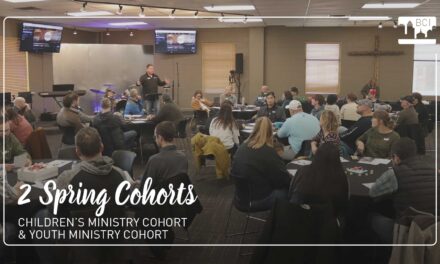Are You Coaching A Team or Building A Fan Base?
By Chris Eller, BCI Associate Executive Director
It’s that time of the year when we all dig out our annual planning tools and start to look into the next year to set our goals and objectives.
One of the first steps is to review the current year. Umm, if you’re like me, I might skip this part. Looking at my plans for 2020 only underscores what a crazy and unpredictable year it has been! Still, with the lessons learned from 2020, we can begin to cautiously look forward into 2021.
As you review your goals and objectives, let me challenge to try and see your plans through the eyes of a regular church member. Will they read your 2021 goals and objectives as a game plan they will play a part in, or will they see it as a game the pastor and staff will play as they watch and cheer you on?
One of the most valuable illustrations I heard this year came from a Masterclass by The Unstuck Group on “Beyond Coping: How to Lead Change & Reach More People.”
The online class featured an interview with Pastor Derwin Gray of Transformation Church in South Carolina. This illustration underscores a major paradigm shift many pastors need to make if they are going to see their church transition from a Sunday morning, program-oriented church to a disciple-making church. Read this illustration carefully:
Game Day vs. Team Meetings
Derwin Gray is founding pastor of Transformation Church in South Carolina. Prior to becoming a pastor, Gray played football with the Indianapolis Colts and the Carolina Panthers.
Saved at 26-years of age, Gray’s life before Christ was football. He spent his time on practice fields, in locker rooms, in weight rooms, at team meetings, traveling to games, and, of course, games. He had coaches that helped him in his specific role on the football team, and the sole goal of these coaches was to prepare him to the best of their ability to play the game of football to the best of Derwin’s ability.
When he became a Christian and God called him into ministry, he knew he wanted to bring this same mindset into his ministry philosophy. He knew he didn’t want to spend time trying to please the crowd, his goal was to help his team—the church—play the game. In this case, the game they were playing was the gospel and the goal was making disciples.
This is the philosophy that is the foundation of Transformation Church. Sunday is not game day. Sunday is the team meeting. The people who come to church are not the fans, they are the players. The pastors and staff are the coaches and their role is not to play the game while the crowd watches, but to prepare the players to play the game to the best of their abilities. The players require different kinds of coaching, but all players need to be a part of the team (a Christian), understand the goal of the game (making disciples), and be as physically, mentally, and spiritually healthy as they can possibly be in order to play to the best of their ability.
This is a paradigm shift for most church leaders: Is Sunday morning team practice or is it the game? Where do you spend your time? Are you preparing to play the game or are you learning how to coach people to play the game? Do you see your church as the crowd watching you play the game, or are they the players being equipped to go into the world and play the game?
Annual Planning & Coaching the Team
Make sure you understand the difference underscored in this example. Honestly, it goes against the grain of how most pastors and churches are wired today.
Survey 100 pastors and I wager the vast majority would identify themselves and the church staff as the team they are thinking of when they sit down to begin their annual planning.
Ask yourself these questions. When you read a goal or objective:
Who will accomplish this in the coming year?
Who is the active agent? Is it a staff member or staff team or is it the congregation?
When a church member reads the goal, will they think, “I want to be a part of this” or will they assume this is a staff member who will be responsible?
Sometimes you can’t answer these questions simply because you are too close to the details. It is helpful to have what Will Mancini calls a “Strategic Outsider,” someone who comes from outside the organization and is not tainted by all the inside noise that creates a strategic myopia. In fact, Mancini argues that every church needs a Strategic Outsider as a key part of their toolbox.
Recently, I sat through a presentation by David Nelms highlighting the work of The Timothy Initiative among unreached people groups. The model of church planting they employ works with astounding success in the regions of the world where they minister, but by David’s own admission, it probably can’t work in America. There are several reasons, but one that struck me relevant to this conversation is the paradigm TTI follows overseas. The people they work with are players, not fans. Built into their training curricula is the expectation that a disciple will in fact find and disciple others. You don’t pass the course without accomplishing this goal.
There is no advantage to converting to Christianity in a Muslim country to sit in church on a Sunday morning and watch a worship service. The persecution is real and the risks are great…too great to simply live as a fan of the local church to check-off your church attendance on Sunday morning and go on to live your life like everyone else in your village. You join “the team” by becoming a Christian in order to play the game, which is to be a gospel influence and teach others to be followers of Jesus Christ.
Brothers and sisters, we need to change the paradigm for how we view church in America. If we are to see a disciple-making movement, we can’t devote our time to prepping for the crowd on Sunday, do our gig, take up an offering, and then send folks home. We need to focus our planning, our goals, and our objectives in a way that communicates the challenge and the risk in front of us. We need players, not fans. We need church members willing to give more than an hour a week and a financial gift. We need Sunday morning to be the team meeting, not game day.
Have a BCI church story to share?
We love to share stories of BCI churches and draw attention to the work God is doing in our convention. Submit your story using the online form.









